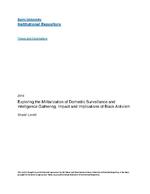|
|

Notes
- Abstract:
- Black activists are marginalized members in a society that systematically attempts to repress their political agendas. The purpose of this research was to provide an explorative analysis of the relationship between militarized surveillance and intelligence gathering tactics and its influence among black activists. This research was conducted not only to study the impact and implications of militarized surveillance and intelligence gathering tactics among black activists, but also to hopefully generate awareness about the issue among all Americans. The data was obtained from a ten-question survey distributed to black activists via SurveyMonkey. There were twenty respondents selected by the means of convenience sampling. The results are only a representation of the opinions of the black activists from my selected sample and are not meant to accurately reflect the opinions of all black activists, due to limitations in my sample size. Since this is a qualitative exploratory story, the responses were analyzed by tallying the frequency of certain responses and collecting open-ended statements. The first hypothesis stated black activists are highly aware of domestic surveillance tactics used by government agencies, such as the NSA, FBI, DHS, and local law enforcement. The data obtained confirmed this hypothesis as respondents indicated that these activists appeared to be well informed and truly aware of the surveillance taking place among black activists. The second hypothesis stated that non-violent black activists believe that the surveillance tactics used by these government agencies are unethical and unnecessary counter-operations in response to their peaceful demonstrations. This hypothesis was also confirmed by the data. The third hypothesis stated that black activists are more likely to refrain from saying, posting, and doing certain acts that would cause them to be under close government surveillance. The data obtained from the surveys disconfirmed this hypothesis. The majority of the responses reflected that the activists are highly unlikely to refrain from posting, saying, and/or doing anything activist-related that would cause them to be under close government surveillance. The results convey a key finding that assumes this generation of black activists refuse to let external governmental forces control their lives through the threat of surveillance.
- Thesis:
- Thesis (Honors)--Barry University, 2016.
- Bibliography:
- Includes bibliographical references (leaves 66-74).
Record Information
- Source Institution:
- Barry University
- Holding Location:
- Barry University Archives and Special Collections
- Rights Management:
- Copyright Shade Lovett. Permission granted to Barry University to digitize, archive and distribute this item for non-profit research and educational purposes. Any reuse of this item in excess of fair use or other copyright exemptions requires permission of the copyright holder.
- Resource Identifier:
- E185.61.S43 2016_LovettShade ( BU-Local )
- Classification:
- E185.61.S43 2016 ( lcc )
|
|